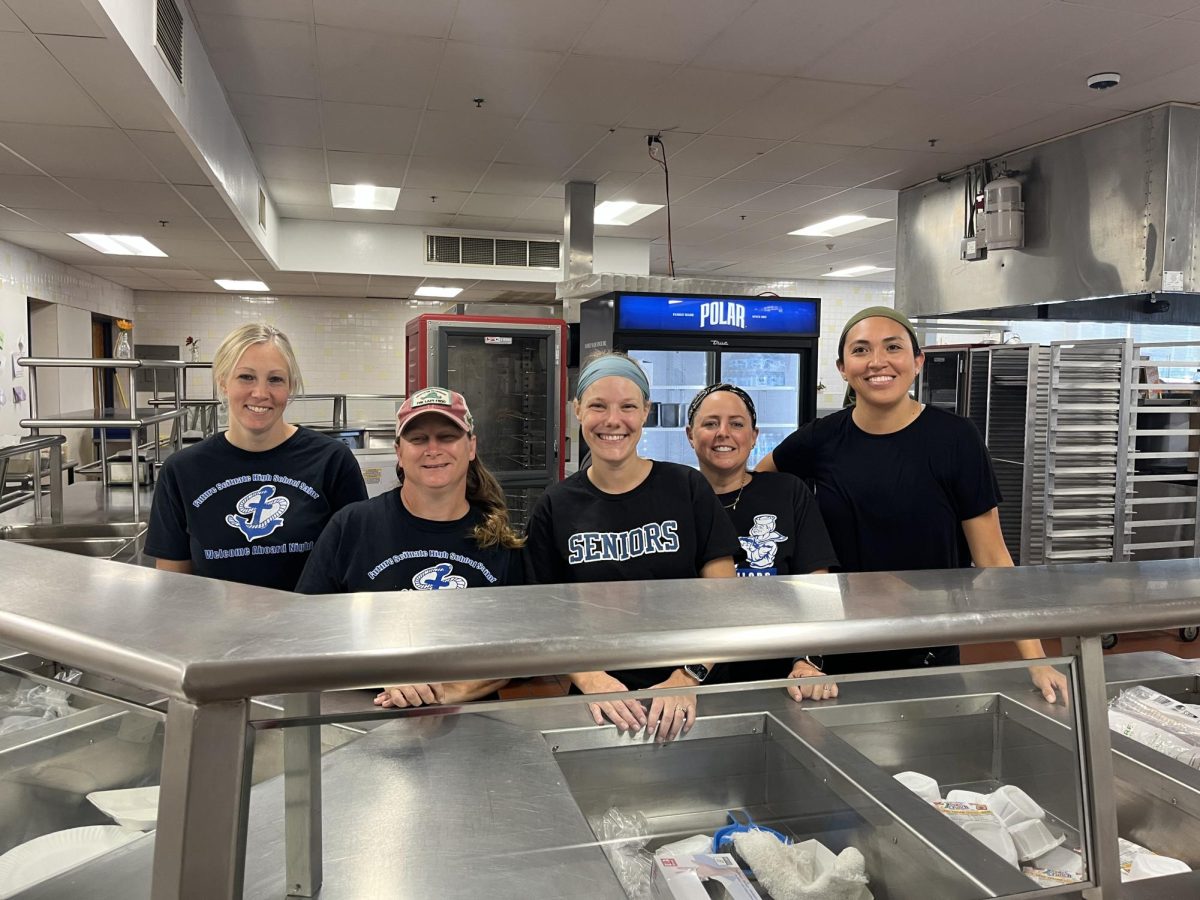At the end of third block, every SHS student is thinking or saying the same thing: I’m starving.
When the lunch bell rings, several hallways experience full-on chaos, as hungry students rush to the clustered cafeteria line to wait for pasta or chicken fingers. If they’re lucky, they might stumble upon a warm quesadilla resting on the hot bar.
In the midst of this daily madness, the SHS cafeteria team remains calm, cool, and collected as they prepare and serve hundreds of unique lunches. They smile, ask students how their day is going, and make sure every SHS student receives a free, nutritious, and filling lunch.
Many students appreciate the impact of these efforts: At a recent journalism brainstorming session, student writers highlighted cafeteria workers as some of the most valuable members of our high school community.
Since a genuine respect for food service is prevalent among students, we wondered if SHS cafeteria workers feel that sentiment. Naturally, we had to get their perspective, so we visited the lunchroom one afternoon to interview Cafeteria Manager Taryn Casagrande and her crew.
At lunch, students may see Casagrande scooping French fries onto lunch trays or hear her wishing them a good day as they type their lunch pin. SHS senior Olivia Hajzler stated, “Every time I have an interaction with Taryn, it’s always very positive and uplifting. I feel like she effortlessly has the ability to make someone’s day.” While Hajzler recognized the other cafeteria workers, she mentioned Casagrande specifically as a positive light in the community.
“I appreciate the kids, love all the kids,” Casagrande commented, noting that she also works as an overnight babysitter on weekends.
Another member of the cafeteria team, Jenna Jenkins, said her favorite aspect of the job is “definitely the kids.” Both Jenkins and Casagrande have families; Jenkins is married and a mother of two boys who attend Marshfield Public Schools, while Casagrande has a twelve-year-old daughter and a husband who works as a custodian at SHS.
During our interview, Casagrande and Jenkins mentioned it had been a tough lunch cycle for the cafeteria workers: It was chicken patty day, and they only had a fraction of the sandwich buns they needed for the 500+ meals they served. Nevertheless, the crew was in good spirits, with the radio blasting as they cleaned up the post-lunch mess. To any SHS student frustrated at the lack of buns, Casagrande lamented, “We are provided fixed amounts of food by the state, and sometimes a mistake is made, or it just isn’t enough.”
Immediately, we had to ask, “Do any of you find the term ‘lunch lady’ offensive?” Surprisingly, they feel quite the opposite: “We are trying to start a TikTok called Lunch Lady Land!” Casagrande told us, while Jenkins added, “I mean, I call myself a lunch lady, so no, I don’t find it offensive.”
Without us asking, the self-proclaimed “lunch ladies” acknowledged their job may not seem the most desirable; when talking about food service occupations, the average person is more likely to highlight jobs in bars or restaurants. Nonetheless, Casagrande and her coworkers couldn’t feel happier in their current jobs. Jenkins said she always wanted to be a lunch lady, even before she started working in food service, and Casagrande said she always leaves the high school feeling “stress-free.”
In fact, most of the SHS lunch ladies have worked in other food industries before, with Casagrande specifically having worked in the beer and wine industry for fourteen years before her current job. Jenkins has worked in a variety of jobs within the food industry, including bars and restaurants.
When asked what she likes more about high school food service, Casagrande said she finds this job much less stressful, and she also loves serving high school-aged kids: “[High schoolers] seemed scary because I thought they would be fresh, smart, mean, but after coming here, I wouldn’t trade you all for anything!”
Naturally, we had to ask what Casagrande’s favorite thing to cook is, to which she enthusiastically replied, “Potatoes!”
In terms of the most challenging aspects of the job, Casagrande replied, “keeping everything crunchy, hot, and quick.” She mentioned that keeping the hot plate options fresh is a challenge because the food can get soggy, so she has to adapt her cooking strategies. With so many students to feed, she has also refined her cooking skills to get meals out fast.
When Casagrande was asked, “How do interactions with students positively impact your days?” she had a complex answer. While most of her student interactions are positive, there are also some negative interactions. Specifically, she mentioned that while most students are extremely polite and ask her how her day is going, there are a select few who are impolite or try to steal Rice Krispies from the snack bar. “If they’re really that hungry, I wish they would just ask me for another lunch,” she commented.
To close our interview, we asked Casagrande to offer a piece of advice for anyone looking to work in a public school cafeteria: “Don’t let other people’s opinions of what you’re doing–or what makes you happy–change what you’re doing,” she said. “I have friends that are lawyers, pediatricians, construction workers. I am just as happy and fulfilled being a lunch lady as they are in their jobs. No matter what anybody says, I enjoy coming to work every day!”
